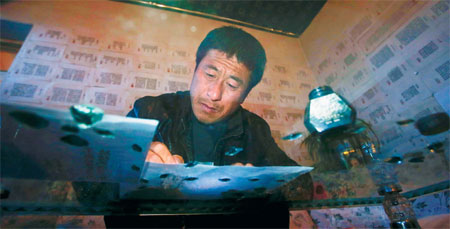Farmers harvest a crop of poetry
Updated: 2012-11-06 10:20
By Peng Yining (China Daily)
|
|||||||||||
 |
|
Ma Jianguo, a 43-year-old farmer and construction worker, is the only poet in his village in Xiji county, in Ningxia Hui autonomous region. |
That evening Zhang, who dropped out of middle school because his parents couldn't afford to keep him there, took out his diary and began writing the first draft of a poem:
I walk
With my skin in my hand
Owning not even a penny
Only my skin
In my hand ...
"I was so desperate, embarrassed and humiliated that I felt I was walking with my skin peeled off and all my flesh exposed," he said. "It wasn't just the sheepskin I was referring to in my diary," he said.
Since middle school, Zhang has written more than 1,000 poems, scribbled in used textbooks and the margins of newspapers and old magazines.
At first, writing was just a hobby. Later it became his livelihood.
Planting potatoes earned Zhang about 3,000 yuan ($480) a year. In 2000, he obtained a loan of 2,000 yuan from friends and printed 400 copies of his first collection of poems, Nightfall, and tried to sell them door to door.
"Hello. My name is Zhang Lian. I am a poet. Would you like to buy my book?" he asked, when knocking on strangers' doors during the slow season. He priced his book at seven yuan and sold 350 copies.
In 2008, he joined Ningxia's Writers Association and became a full-time writer. This year Zhang was chosen as one of the "Ten Best Rural Poets" by the Chinese Writers Association and published his eighth collection. He can earn around 30,000 yuan per annum from doorstep sales, enough to allow his family to move from their village to the local town.
A large number of impoverished writers live in this poverty-stricken province, including accomplished poets, novelists and winners of national awards. In south Ningxia's mountainous region, which the United Nations identified as one of the most uninhabitable zones in the world in the 1970s, these potato-planting literati struggle to feed their families but maintain their faith in writing. For them, literature is not just a spiritual quest, it may also lead to a better life.
Last year, Xiji, one of the poorest counties in the region, was designated "The Hometown of Literature in China" by the Chinese Writers Association and the China Literature Foundation, because of the popularity of literature in general and the many high-caliber works by local authors.
Their work is called Xihaigu Literature, a portmanteau derived from the names of some of the poorest southern counties, including Xiji, Haiyuan and Guyuan. It is a crucible of rural Chinese literature, acknowledged by the recent Nobel Prize awarded to one of its most representative writers, Mo Yan.
Related Stories
Book fair opens in Russian Siberia 2012-11-02 11:02
Bram Stoker's restored 'Dracula' desk up for auction 2012-11-01 15:08
Romano: Americans look East now 2012-10-30 09:44
Philosophical melting pot 2012-10-30 09:35
English animal tales now in Chinese 2012-10-23 10:26
Today's Top News
Rescuers race against time for quake victims
Telecom workers restore links
Coal mine blast kills 18 in Jilin
Intl scholarship puts China on the map
More bird flu patients discharged
Gold loses sheen, but still a safe bet
US 'turns blind eye to human rights'
Telecom workers restore links
Hot Topics
Lunar probe , China growth forecasts, Emission rules get tougher, China seen through 'colored lens', International board,
Editor's Picks

|

|

|

|

|

|





